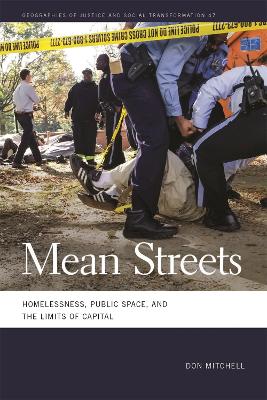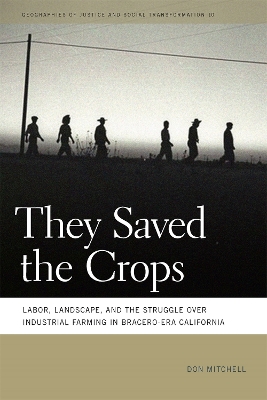Geographies of Justice and Social Transformation
2 total works
The problem of homelessness in America underpins the definition of an American city: what it is, who it is for, what it does, and why it matters. And the problem of the American city is epitomized in public space. Mean Streets offers, in a single, sustained argument, a theory of the social and economic logic behind the historical development, evolution, and especially the persistence of homelessness in the contemporary American city. By updating and revisiting thirty years of research and thinking on this subject, Don Mitchell explores the conditions that produce and sustain homelessness and how its persistence relates to the way capital works in the urban built environment. He also addresses the historical and social origins that created the boundary between public and private. Consequently, he unpacks the structure, meaning, and governance of urban public space and its uses.
Mitchell traces his argument through two sections: a broadly historical overview of how homelessness has been managed in public spaces, followed by an exploration of recent Supreme Court jurisprudence that expands our national discussion. Beyond the mere regulation of the homeless and the poor, homelessness has metastasized more recently, Mitchell argues, to become a general issue that affects all urbanites.
Mitchell traces his argument through two sections: a broadly historical overview of how homelessness has been managed in public spaces, followed by an exploration of recent Supreme Court jurisprudence that expands our national discussion. Beyond the mere regulation of the homeless and the poor, homelessness has metastasized more recently, Mitchell argues, to become a general issue that affects all urbanites.
A MacArthur Award-winning scholar explores the explosive intersection of farming, immigration, and big business
At the outset of World War II, California agriculture seemed to be on the cusp of change. Many Californians, reacting to the ravages of the Great Depression, called for a radical reorientation of the highly exploitative labour relations that had allowed the state to become such a productive farming frontier. But with the importation of the first braceros-""guest workers"" from Mexico hired on an ""emergency"" basis after the United States entered the war-an even more intense struggle ensued over how agriculture would be conducted in the state. Esteemed geographer Don Mitchell argues that by delineating the need for cheap, flexible farm labour as a problem and solving it via the importation of relatively disempowered migrant workers, an alliance of growers and government actors committed the United States to an agricultural system that is, in important respects, still with us.
They Saved the Crops is a theoretically rich and stylistically innovative account of grower rapaciousness, worker militancy, rampant corruption, and bureaucratic bias. Mitchell shows that growers, workers, and officials confronted a series of problems that shaped-and were shaped by-the landscape itself. For growers, the problem was finding the right kind of labour at the right price at the right time. Workers struggled for survival and attempted to win power in the face of economic exploitation and unremitting violence. Bureaucrats tried to harness political power to meet the demands of, as one put it, ""the people whom we serve.""
Drawing on a deep well of empirical materials from archives up and down the state, Mitchell's account promises to be the definitive book about California agriculture in the turbulent decades of the mid-twentieth century.
At the outset of World War II, California agriculture seemed to be on the cusp of change. Many Californians, reacting to the ravages of the Great Depression, called for a radical reorientation of the highly exploitative labour relations that had allowed the state to become such a productive farming frontier. But with the importation of the first braceros-""guest workers"" from Mexico hired on an ""emergency"" basis after the United States entered the war-an even more intense struggle ensued over how agriculture would be conducted in the state. Esteemed geographer Don Mitchell argues that by delineating the need for cheap, flexible farm labour as a problem and solving it via the importation of relatively disempowered migrant workers, an alliance of growers and government actors committed the United States to an agricultural system that is, in important respects, still with us.
They Saved the Crops is a theoretically rich and stylistically innovative account of grower rapaciousness, worker militancy, rampant corruption, and bureaucratic bias. Mitchell shows that growers, workers, and officials confronted a series of problems that shaped-and were shaped by-the landscape itself. For growers, the problem was finding the right kind of labour at the right price at the right time. Workers struggled for survival and attempted to win power in the face of economic exploitation and unremitting violence. Bureaucrats tried to harness political power to meet the demands of, as one put it, ""the people whom we serve.""
Drawing on a deep well of empirical materials from archives up and down the state, Mitchell's account promises to be the definitive book about California agriculture in the turbulent decades of the mid-twentieth century.

